
Mozambique, officially the Republic of Mozambique, is a country located in southeast Africa bordered by the Indian Ocean to the east, Tanzania to the north, Malawi and Zambia to the northwest, Zimbabwe to the west, and Eswatini and South Africa to the south and southwest. The sovereign state is separated from the Comoros, Mayotte and Madagascar by the Mozambique Channel to the east. The capital and largest city is Maputo.

Samora Moisés Machel was a Mozambican politician and revolutionary. A socialist in the tradition of Marxism–Leninism, he served as the first President of Mozambique from the country's independence in 1975 until his death in a plane crash in 1986.
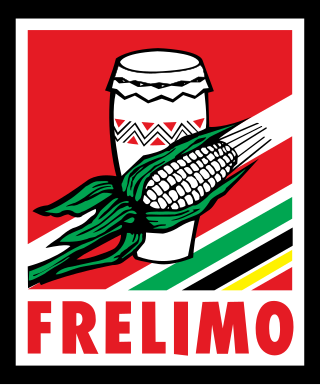
FRELIMO is a democratic socialist political party in Mozambique. It has governed the country since its independence from Portugal in 1975.
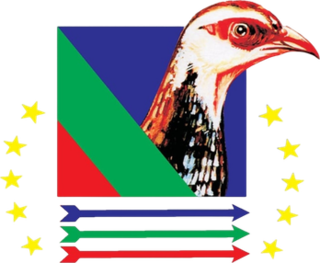
RENAMO is a Mozambican political party and militant group. The party was founded with the active sponsorship of the Rhodesian Central Intelligence Organisation (CIO) in May 1977 from anti-communist dissidents opposed to Mozambique's ruling FRELIMO party. RENAMO was initially led by André Matsangaissa, a former senior official in FRELIMO's armed wing, and was composed of several anti-communist dissident groups which appeared immediately prior to, and shortly following, Mozambican independence. Matsangaissa, who died in 1979, was succeeded by Afonso Dhlakama, who led the organization until he died in 2018. He was succeeded by Ossufo Momade.
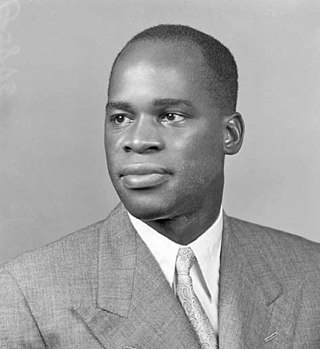
Eduardo Chivambo Mondlane was a Mozambican revolutionary and anthropologist, and founder of the Mozambican Liberation Front (FRELIMO). He served as the FRELIMO's first leader until his assassination in 1969 in Tanzania. An anthropologist by profession, Mondlane also worked as a history and sociology professor at Syracuse University before returning to Mozambique in 1963.

Armando Emílio Guebuza is a Mozambican politician who was the third President of Mozambique from 2005 to 2015.

Afonso Marceta Macacho Dhlakama was a Mozambican politician and the leader of RENAMO, an anti-communist guerrilla movement that fought the FRELIMO government in the Mozambican Civil War before signing a peace agreement and becoming an opposition political party in the early 1990s. Dhlakama was born in Mangunde, Sofala Province.

The Portuguese Colonial War, also known in Portugal as the Overseas War or in the former colonies as the War of Liberation, and also known as the Angolan, Guinea-Bissau and Mozambican War of Independence, was a 13-year-long conflict fought between Portugal's military and the emerging nationalist movements in Portugal's African colonies between 1961 and 1974. The Portuguese regime at the time, the Estado Novo, was overthrown by a military coup in 1974, and the change in government brought the conflict to an end. The war was a decisive ideological struggle in Lusophone Africa, surrounding nations, and mainland Portugal.

The Mozambican Civil War was a civil war fought in Mozambique from 1977 to 1992. Like many regional African conflicts during the late twentieth century, the impetus for the Mozambican Civil War included local dynamics exacerbated greatly by the polarizing effects of Cold War politics. The war was fought between Mozambique's ruling Marxist Mozambique Liberation Front (FRELIMO), the anti-communist insurgent forces of the Mozambican National Resistance (RENAMO), and a number of smaller factions such as the PRM, UNAMO, COREMO, UNIPOMO, and FUMO.

Mueda is the largest town of the Makonde Plateau in northeastern Mozambique. It is the capital of the Mueda District in Cabo Delgado Province. It is the center of the culture of the Makondes, and the production of their ebony sculptures.
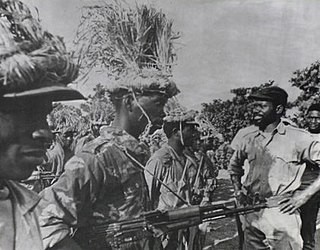
The Mozambican War of Independence was an armed conflict between the guerrilla forces of the Mozambique Liberation Front (FRELIMO) and Portugal. The war officially started on 25 September 1964, and ended with a ceasefire on 8 September 1974, resulting in a negotiated independence in 1975.
Filipe Samuel Magaia was a Mozambican revolutionary and guerrilla leader. He was the Secretary of Defense for the Mozambican FRELIMO organisation during the Mozambican War of Independence. After a number of years fighting, Magaia was assassinated by a renegade FRELIMO soldier who was working for the Portuguese.

Marcelino dos Santos was a Mozambican poet, revolutionary, and politician. As a young man he travelled to Portugal, and France for an education. He was a founding member of the Frente de Libertação de Moçambique, in 1962, and served as the party's deputy president from 1969 to 1977. He was Minister of Economic Development in the late 1970s, Frelimo Political Bureau member in charge of the economy in the early 1980s, Chairman of the country's parliament, the Assembly of the Republic, from 1987 to 1994, and, as of 1999, remained a member of the Frelimo Central Committee. He represented the left wing of the party, remaining an avowed Marxist-Leninist, despite the party's embrace of capitalism in recent decades, an embrace which dos Santos declared was temporary.

The People's Republic of Mozambique was a socialist state that existed in present-day Mozambique from 1975 to 1990. It was established when the country gained independence from Portugal in June 1975 and the Mozambican Liberation Front ("FRELIMO") established a one-party socialist state led by Samora Machel. The state enjoyed close political and military ties with the Soviet Union, which was one of the first nations to provide diplomatic recognition and financial support to the fledgling FRELIMO government. For the duration of its history, the People's Republic of Mozambique remained heavily dependent on Soviet aid, both in financial terms as well as with regards to food security, fuel, and other vital economic necessities. From 1977 to 1992, the country was devastated by a deadly civil war which pitted the armed forces against the anti-communist Mozambique National Resistance (RENAMO) insurgency, backed by neighbouring Rhodesia and South Africa.
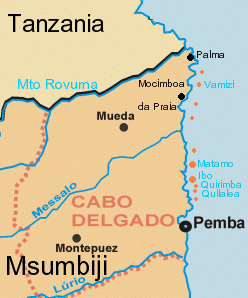
Operation Gordian Knot was the largest and most expensive Portuguese military campaign in the Portuguese overseas province of Mozambique, East Africa. The operation was carried out in 1970, during the Portuguese Colonial War (1961–1974). The objectives of the campaign were to close down the Mozambique Liberation Front (FRELIMO)'s infiltration routes across the Tanzanian border and to destroy permanent FRELIMO bases inside the liberated zones in Northern Mozambique. Gordian Knot was a seven-month long campaign ultimately employing 35,000 men, and was almost successful since it destroyed most guerrilla camps located inside FRELIMO's liberated zones and captured large numbers of rebels and armaments, forcing FRELIMO to retreat from their bases and outposts in the provinces.
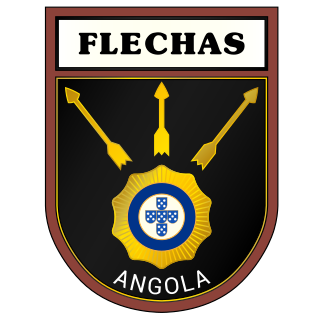
The Flechas were an elite paramilitary tactical unit of the Portuguese secret police that operated in Angola and Mozambique during the Portuguese Colonial War. Unlike most of the other Portuguese special forces that were employed in the several theatres of operations of the conflict, the Flechas were not a de jure military unit but a PIDE/DGS unit.
Operation Eland, also known as the Nyadzonya Raid, was a military operation carried out by the Rhodesian Selous Scouts at Nyadzonya in Mozambique on 9 August 1976.
The Wiriyamu Massacre or Operation Marosca was a massacre of the civilian population of the village of Wiriyamu in Mozambique by Portuguese soldiers in December 1972.
Operation Penada was the name of a Portuguese military operation that occurred during the Portuguese Colonial War in Mozambique, in April 1972. The Portuguese 31st Battalion of Hunters took part in the operation, the battalion had been stationed in Furancungo.
Operation Eagle was the first organised operation of the Portuguese Armed Forces in response to the attack of the FRELIMO guerrilla group, on 25 September 1964, to the administrative post of Chai, in the district of Cabo Delgado, materialising therefore in the first operation in the one of Portuguese Colonial War in the theatre of operations of Mozambique.














